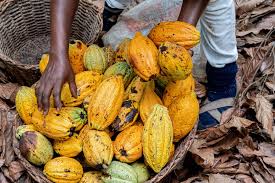Increase in producer cocoa price heartwarming for farmers
Ghana Cocoa Board (COCOBOD) announced a significant increase in cocoa price for the 2024-2025 season, pegging it at GH¢48,000 per tonne.
This translates to GH¢3,000 per 64-kilogramme bag of cocoa, marking an unprecedented 129.36 percent increase from the previous season.
Minister for Food and Agriculture Bryan Acheampong made the important announcement last week and stressed the new price’s importance to livelihoods of cocoa farmers and the cocoa industry’s future.
The decision was made after careful analysis of the global cocoa market, which has experienced significant fluctuations in prices over the past year.
Mr. Acheampong explained that spot-prices for cocoa had risen dramatically from US$2,000 per tonne in March 2023, peaking at US$12,000 per tonne in February 2024 before falling to US$7,960 per tonne in September 2024.
On the futures market, prices followed a similar pattern – rising from US$2,200 to over US$10,000 per tonne in February 2024 before dropping to US$6,246 in September. These market conditions necessitated a thorough review before any pricing decisions were made.
The significant increase in producer price of cocoa demonstrates government’s commitment to improving the cocoa sector and supporting Ghanaian cocoa farmers’ livelihoods.
As the world’s second-largest cocoa producer, the country’s cocoa sector continues to face challenges related to market volatility and external competition. . In April 2024 the country had already raised the price of cocoa by over 58 percent for the mid-season crop, bringing the price to GH¢33,120 per metric tonne or GH¢2,070 per 64-kilogramme bag.
This move was seen as essential in aligning Ghana’s prices with neighbouring Côte d’Ivoire, the top global cocoa producer, in an effort to curb cross-border smuggling – a long-standing issue in the region.
Although Côte d’Ivoire has yet to announce its farmgate price for the 2024-2025 season, many industry insiders believe that Ghana’s current price adjustment will influence its decision. Price parity between the two countries is crucial for maintaining market stability and preventing illegal movements of cocoa across borders.
Despite the above, COCOBOD has revised its production target for the 2024-2025 season downward by nearly 20 percent.
Boosting the country’s livestock industry
Deputy Minister of Food and Agriculture, Mohammed Hardi Tuferiru, has launched ‘National Livestock Day’, a celebration promoting the country’s livestock industry and its significant contributions to food security and economic growth.
Organised by Ghana National Association of Cattle Farmers (GNACAF) in collaboration with the Ministry of Food and Agriculture and Ministry of National Security, it was launched at the MoFA Project Office in Accra.
The Deputy Minister emphasised the livestock industry’s critical role in Ghana’s economy, noting that it plays a vital role in the livelihoods of many – especially in rural areas. He highlighted the importance of supporting locally produced meat and promoting the livestock industry’s development.
National Livestock Day will be celebrated on October 3-4 this year at Efua Sutherland Park in Accra. The event will feature a showcase of diverse ruminant livestock breeds as well as a heavy discount on meat products for the general public.
Indeed, National Livestock Day aims at bringing together stakeholders from across the sector to promote the domestic livestock industry’s growth and development. The theme of National Livestock Day is ‘A thriving livestock industry toward sustainable food security and economic growth’.
Alhaji Mohammed Hardi Tuferiru highlighted government’s commitment to creating an enabling environment for the livestock industry – including initiatives to promote semi-intensive and intensive livestock farming systems, knowledge-sharing and addressing challenges such as conflicts between livestock herders and crop farmers.
This can be exemplified by Rearing for Food and Jobs (RFJ), which is one of the modules in government’s flagship agricultural programme christened Planting for Food and Jobs (PFJ). RFJ is a five-year programme running from 2019 to 2023.
In launching the programme, it was recalled that president had bemoaned the steep decline of Ghana’s livestock sector – which has been largely attributed to high cost of production and competition from cheap imports of livestock and their products, forcing most livestock producers to stop producing meat and concentrate solely on crop production.
Ghana imports roughly US$400million worth of meat products annually, with local meat production accounting for only 19% of the country’s meat requirements. Hence need for the Rearing for Food and Jobs campaign.










